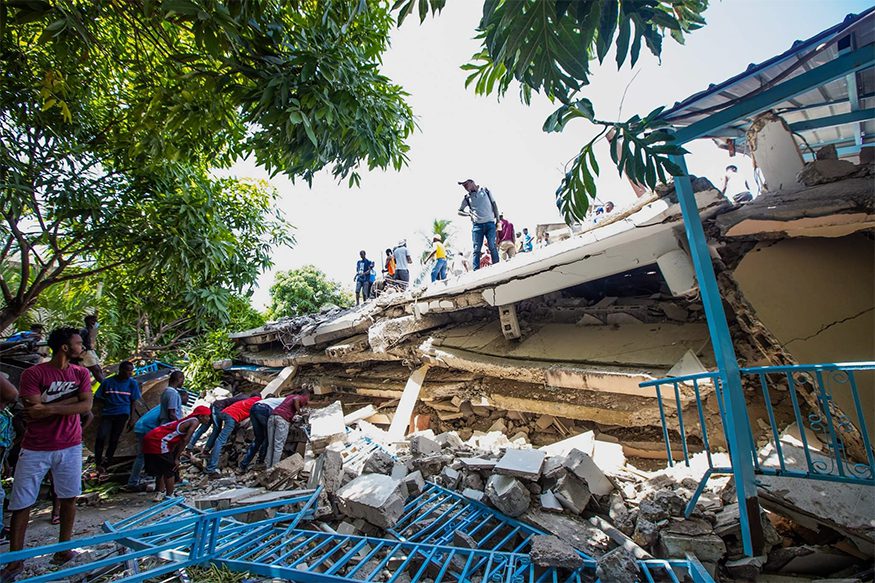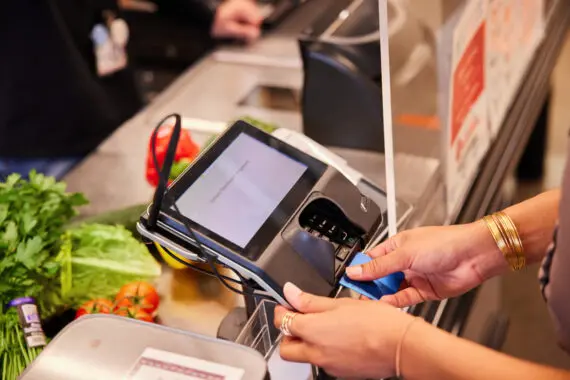By Michele Learner
All too often, we see Haiti in the news because its people have suffered another in a series of devastating natural disasters. The most recent, an earthquake on August 14, 2021, caused more than 2,200 deaths. At least 130,000 homes, along with schools and clinics were destroyed near the epicenter in the country’s rural southwest. Rescue efforts were hindered by poor infrastructure, with many roads blocked by debris, and by heavy rains and flooding from Tropical Storm Grace, which immediately followed the earthquake. More than a million people are in need of humanitarian assistance, particularly access to food, clean water, and shelter.
In “normal” times, Haiti’s population struggles to care for their families. Haiti has made significant progress against child mortality and child malnutrition over the past few decades. But with nearly 60 percent of the population living below the poverty line, hunger among children is still far too common. Stunting, the result of chronic malnutrition in early childhood, affects more than one in five children (21.9 percent), with acute malnutrition, sometimes called wasting, at 3.7 percent.
About two-thirds of Haiti’s people rely on agriculture, mainly on small farms, for their livelihoods, making resilience to environmental shocks extremely important to food security. Lack of access to irrigation and erosion due to increasing deforestation pose particular obstacles to increasing the size of harvests. The good news is that Haiti has a vibrant network of civil society organizations with expertise in local agricultural challenges and other fundamental quality of life issues that determine whether families are able to give their children the nutritious food they need.
Haiti’s location, with major fault lines stretching through the country, puts its people at high risk of earthquakes. As a small island nation, Haiti also experiences hurricanes. Many Bread members will clearly remember the country’s most devastating earthquake of modern times, in January 2010. The death toll was staggering because although the epicenter was along the same fault line as the 2021 earthquake, it was far closer to the capital city of Port-au-Prince. Haiti, with a population of only about 10 million, had an estimated 250,000 people killed and up to 3 million people affected. Eleven years later, Haiti is still working to recover.
The region where the earthquake hit is also still recovering from Hurricane Matthew in 2016, the first category 4 storm in decades to make landfall in Haiti. Among other impacts, it made more than 1.4 million people food insecure.
Any country would face a multitude of difficulties in the aftermath of an enormous tragedy like the 2010 earthquake. Haiti is also extremely vulnerable to climate change, which as Bread has emphasized, is one of the main causes of global hunger today. Haiti is near the top of any list of nations at highest risk of natural disaster. For example, it was at the number one spot on the 2018 Global Climate Risk Index.
While the fault lines that cause earthquakes have, for all practical purposes, always been there, climate change has exacerbated the threat to human life. Yet, as is the case around the world, Haiti contributes almost nothing to the problem that carries such deadly consequences for its people. The average person in the United States produces 82 times the emissions level of the average person in Haiti.
Climate change is not the only cause of hunger in Haiti, but it is among the most important. The Washington Post described the 2021 earthquake as “the most recent disaster in a country that has suffered from decades of political, economic, and social setbacks and inequalities.” Among other factors that contribute to hunger are COVID-19 with “a scarce vaccine supply, gang violence that aid agencies have warned is threatening to imperil relief efforts, and political turmoil that was deepened by the assassination of President Jovenel Moïse last month.”
All of this means that it is even more important than ever to ensure that humanitarian assistance contributions from the U.S. government and other American sources, which have always been very generous, are as effective as possible. Close cooperation with both the Haitian government and local civil society organizations is essential.
During her August 26 visit to Haiti, USAID Administrator Samantha Power emphasized the necessity of working in partnership with groups that understand the varied local contexts and community needs in the aftermath of disaster. In addition, identifying and adopting strategies that have proven effective in recent humanitarian assistance efforts elsewhere in the world is important to improving our ability to help communities recover. We can help ensure that people have nutritious food and children are able to grow, learn, and prosper.
In situations like these, it can be difficult to know what to do or how we can help. Here are three suggestions:
Pray. Bread for the World believes in the power of prayer. Use the prayer below or pray your own.
Learn. Educate yourself on what is happening, including the history of the country and U.S. involvement in it, and look for sources that amplify the voices of people who have historically been marginalized.
Do. Connect with organizations you know and trust to volunteer, donate, or otherwise contribute your time, money, and energy to supporting those who are affected.
Prayer
Holy God, our Creator, Redeemer, and Sustainer,
The world is so full of tragedy in this moment—wars and turmoil, flooding from hurricanes, wildfires and extreme hunger from drought conditions, and healthcare systems stretched way beyond their limits by COVID-19.
In the midst of all of this
we pause
to remember our siblings in Haiti.
We pray for those who have been injured and have yet to be treated,
for healthcare workers who are trying to reach them.
We pray for those who need food,
for those who need shelter,
for those who need hope.
We pray for aid workers and NGOs. May they do no harm.
In this time of continued political instability, we pray for leaders—leaders in government in Haiti and around the world, leaders in communities, and leaders rising up in the crisis.
May they be guided by your wisdom, compassion, and grace.
May their agendas be grounded in unity and peace instead of competition and conflict.
God, we confess that we don’t always know what to do. The interventions of our country are not always helpful or harmless. Guide our hearts to stay prayerful, guide our minds to learn more, and guide our spirits to provide support for recovery efforts.
We pray this prayer in the one in whom we put our trust, your son, Jesus Christ.
Amen



